Political Comment and Free Speech on Social Media: A Research Paper
VerifiedAdded on 2022/11/25
|12
|2348
|116
Report
AI Summary
This research paper examines the complex relationship between free speech and political comment on social media platforms. It explores the use of social media as a platform for expressing opinions, while also highlighting the potential negative consequences, such as the spread of misinformation, hate speech, and the influence on young voters. The paper addresses key questions, including the nature of free speech in the digital age, the role of political communication on social media, and the severity of issues like cyber threats and the impact of biased comments. The paper discusses how governments and social media companies can approach these challenges through self-regulation, legislation, and educational initiatives. It uses examples from Germany, Indonesia, and the UK to illustrate the different strategies employed to manage online political discourse and protect users from harmful content. The conclusion emphasizes the need for a balanced approach that protects freedom of expression while mitigating the risks associated with online political communication.
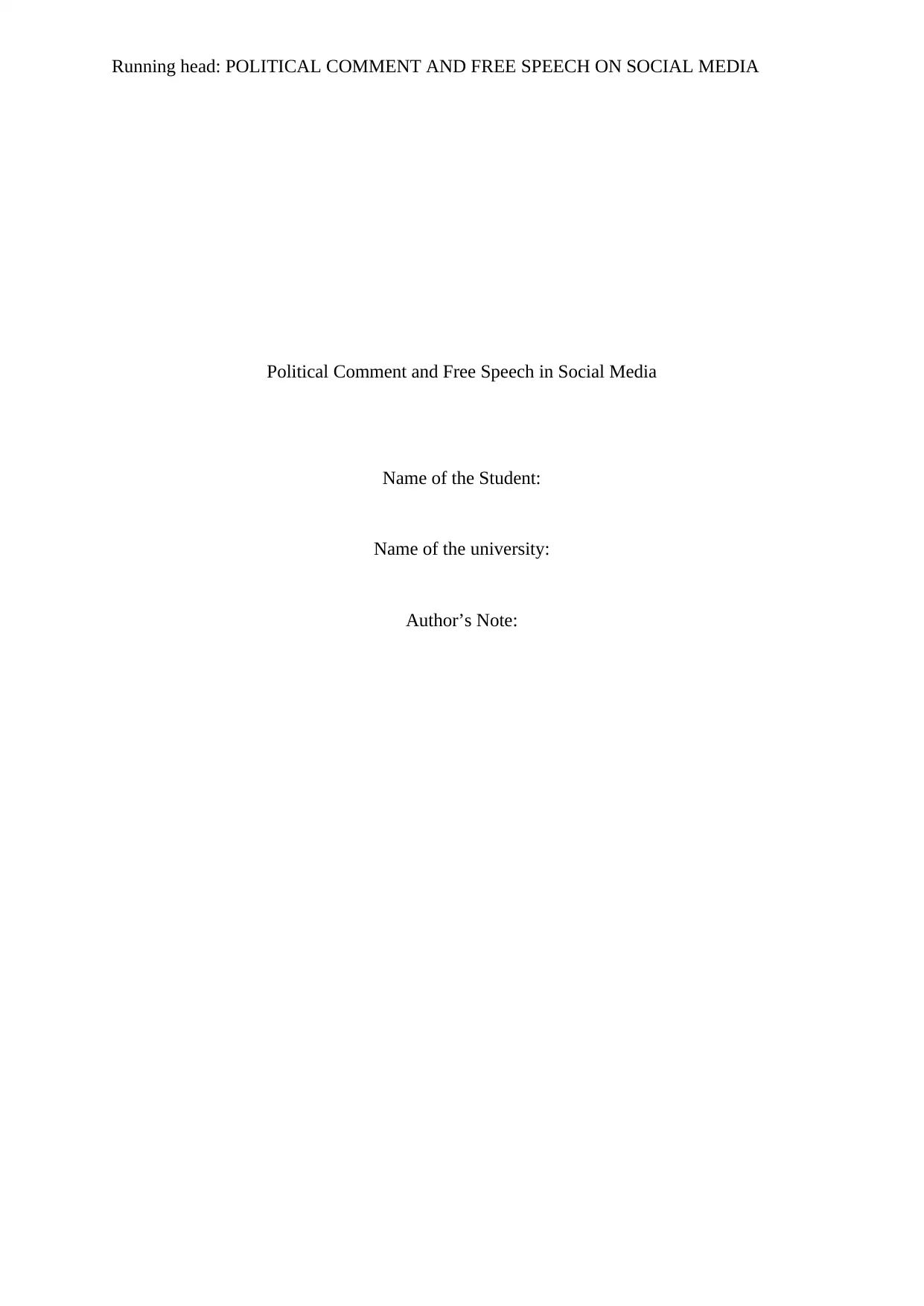
Running head: POLITICAL COMMENT AND FREE SPEECH ON SOCIAL MEDIA
Political Comment and Free Speech in Social Media
Name of the Student:
Name of the university:
Author’s Note:
Political Comment and Free Speech in Social Media
Name of the Student:
Name of the university:
Author’s Note:
Paraphrase This Document
Need a fresh take? Get an instant paraphrase of this document with our AI Paraphraser
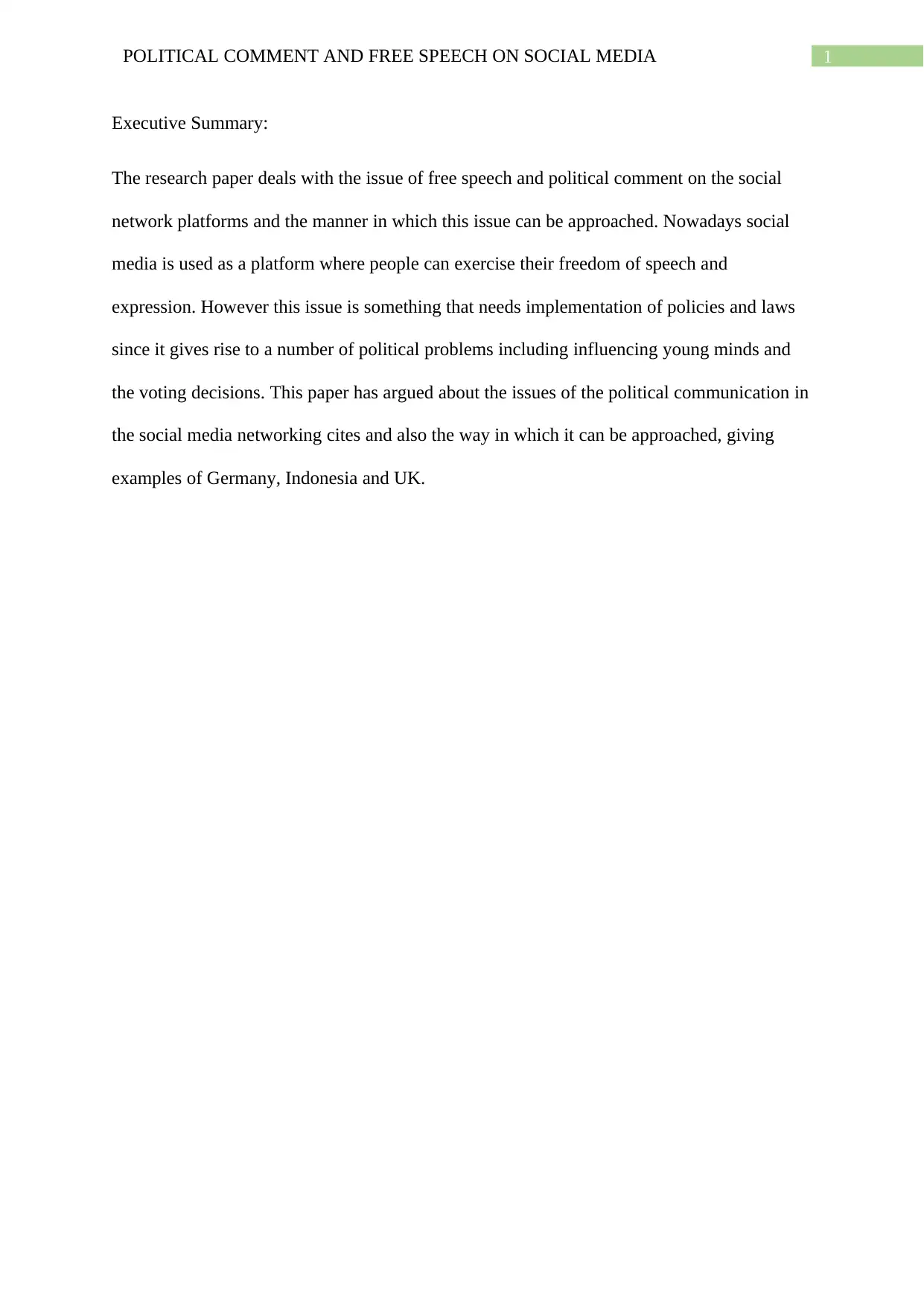
1POLITICAL COMMENT AND FREE SPEECH ON SOCIAL MEDIA
Executive Summary:
The research paper deals with the issue of free speech and political comment on the social
network platforms and the manner in which this issue can be approached. Nowadays social
media is used as a platform where people can exercise their freedom of speech and
expression. However this issue is something that needs implementation of policies and laws
since it gives rise to a number of political problems including influencing young minds and
the voting decisions. This paper has argued about the issues of the political communication in
the social media networking cites and also the way in which it can be approached, giving
examples of Germany, Indonesia and UK.
Executive Summary:
The research paper deals with the issue of free speech and political comment on the social
network platforms and the manner in which this issue can be approached. Nowadays social
media is used as a platform where people can exercise their freedom of speech and
expression. However this issue is something that needs implementation of policies and laws
since it gives rise to a number of political problems including influencing young minds and
the voting decisions. This paper has argued about the issues of the political communication in
the social media networking cites and also the way in which it can be approached, giving
examples of Germany, Indonesia and UK.
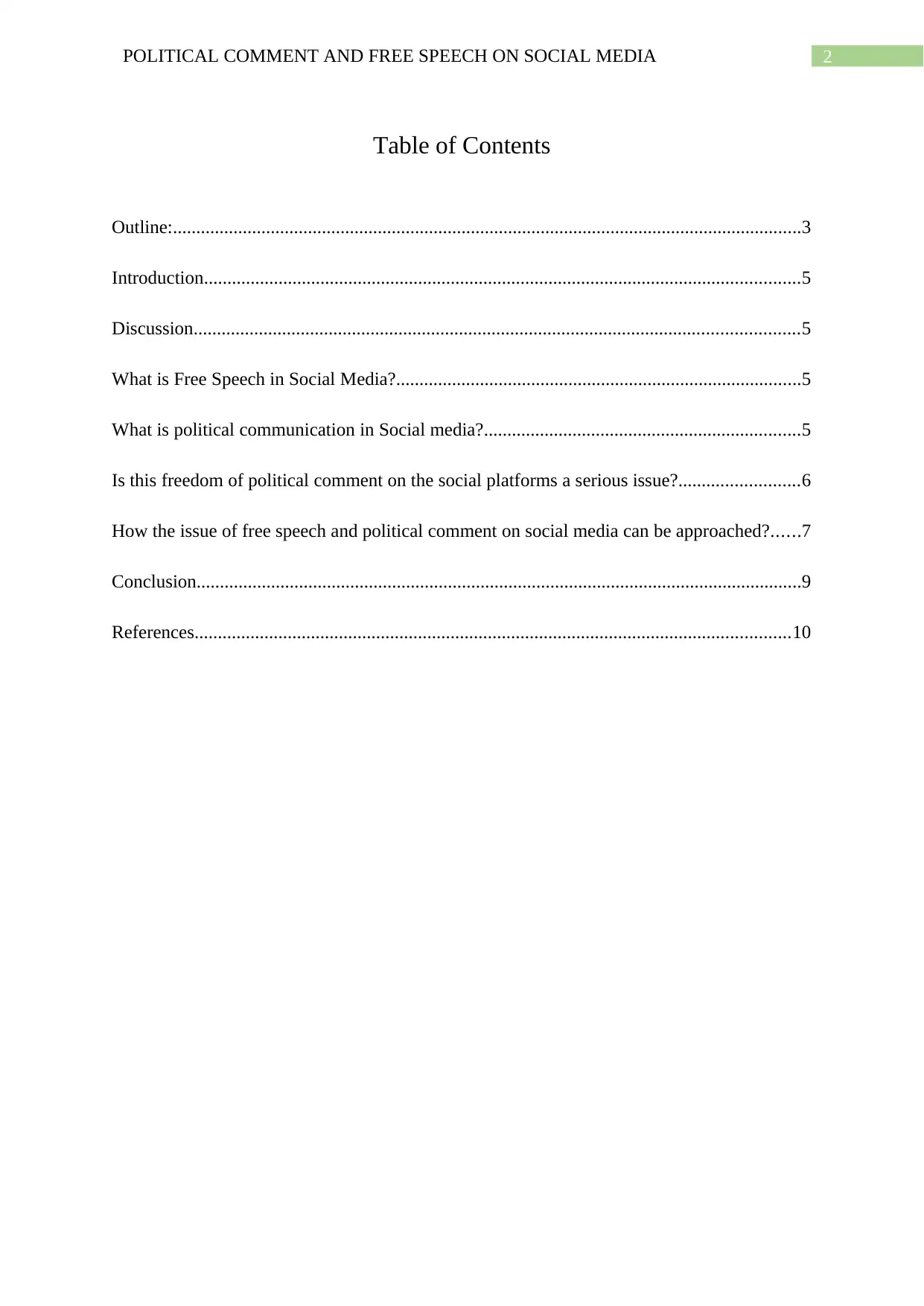
2POLITICAL COMMENT AND FREE SPEECH ON SOCIAL MEDIA
Table of Contents
Outline:.......................................................................................................................................3
Introduction................................................................................................................................5
Discussion..................................................................................................................................5
What is Free Speech in Social Media?.......................................................................................5
What is political communication in Social media?....................................................................5
Is this freedom of political comment on the social platforms a serious issue?..........................6
How the issue of free speech and political comment on social media can be approached?......7
Conclusion..................................................................................................................................9
References................................................................................................................................10
Table of Contents
Outline:.......................................................................................................................................3
Introduction................................................................................................................................5
Discussion..................................................................................................................................5
What is Free Speech in Social Media?.......................................................................................5
What is political communication in Social media?....................................................................5
Is this freedom of political comment on the social platforms a serious issue?..........................6
How the issue of free speech and political comment on social media can be approached?......7
Conclusion..................................................................................................................................9
References................................................................................................................................10
⊘ This is a preview!⊘
Do you want full access?
Subscribe today to unlock all pages.

Trusted by 1+ million students worldwide
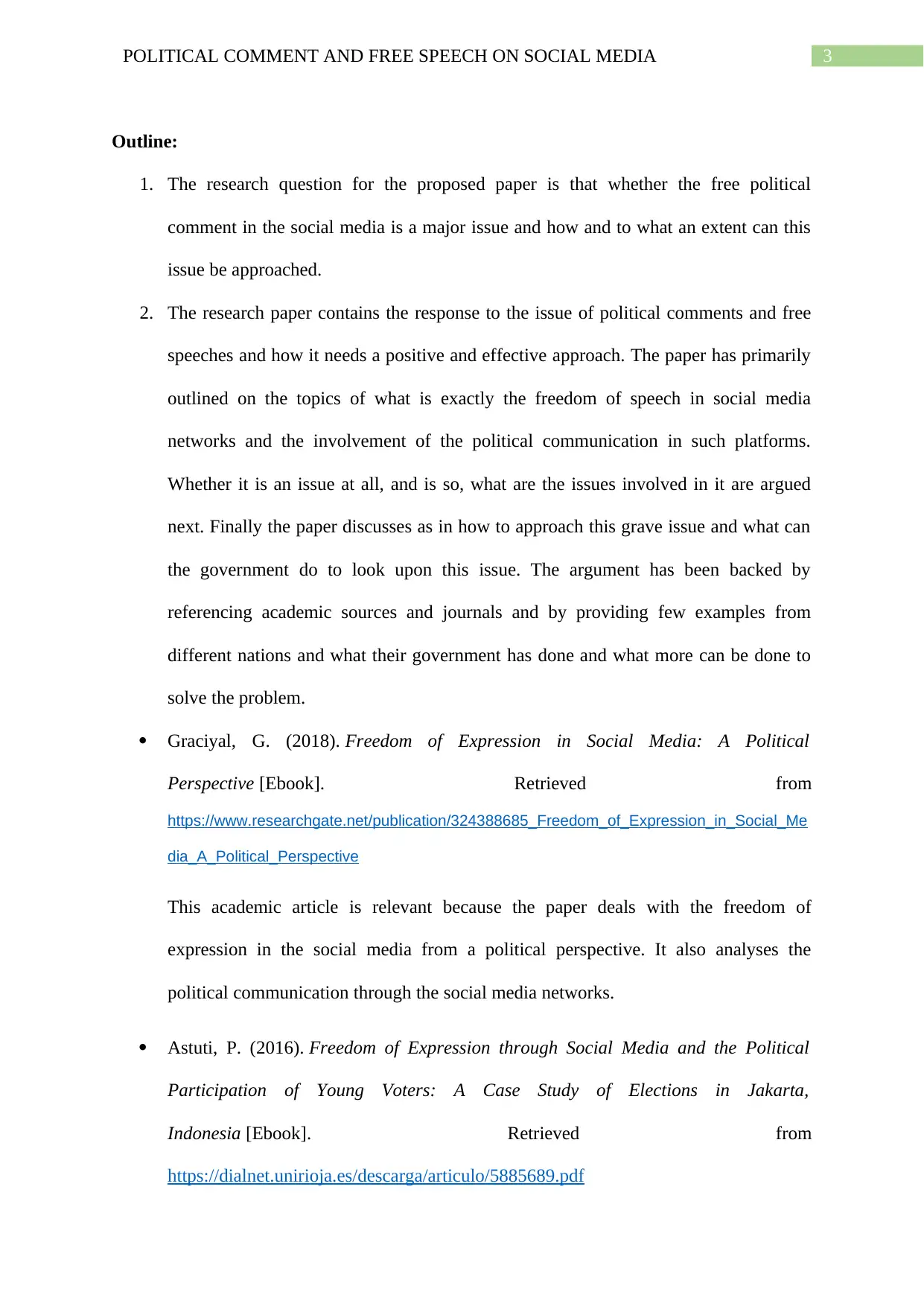
3POLITICAL COMMENT AND FREE SPEECH ON SOCIAL MEDIA
Outline:
1. The research question for the proposed paper is that whether the free political
comment in the social media is a major issue and how and to what an extent can this
issue be approached.
2. The research paper contains the response to the issue of political comments and free
speeches and how it needs a positive and effective approach. The paper has primarily
outlined on the topics of what is exactly the freedom of speech in social media
networks and the involvement of the political communication in such platforms.
Whether it is an issue at all, and is so, what are the issues involved in it are argued
next. Finally the paper discusses as in how to approach this grave issue and what can
the government do to look upon this issue. The argument has been backed by
referencing academic sources and journals and by providing few examples from
different nations and what their government has done and what more can be done to
solve the problem.
Graciyal, G. (2018). Freedom of Expression in Social Media: A Political
Perspective [Ebook]. Retrieved from
https://www.researchgate.net/publication/324388685_Freedom_of_Expression_in_Social_Me
dia_A_Political_Perspective
This academic article is relevant because the paper deals with the freedom of
expression in the social media from a political perspective. It also analyses the
political communication through the social media networks.
Astuti, P. (2016). Freedom of Expression through Social Media and the Political
Participation of Young Voters: A Case Study of Elections in Jakarta,
Indonesia [Ebook]. Retrieved from
https://dialnet.unirioja.es/descarga/articulo/5885689.pdf
Outline:
1. The research question for the proposed paper is that whether the free political
comment in the social media is a major issue and how and to what an extent can this
issue be approached.
2. The research paper contains the response to the issue of political comments and free
speeches and how it needs a positive and effective approach. The paper has primarily
outlined on the topics of what is exactly the freedom of speech in social media
networks and the involvement of the political communication in such platforms.
Whether it is an issue at all, and is so, what are the issues involved in it are argued
next. Finally the paper discusses as in how to approach this grave issue and what can
the government do to look upon this issue. The argument has been backed by
referencing academic sources and journals and by providing few examples from
different nations and what their government has done and what more can be done to
solve the problem.
Graciyal, G. (2018). Freedom of Expression in Social Media: A Political
Perspective [Ebook]. Retrieved from
https://www.researchgate.net/publication/324388685_Freedom_of_Expression_in_Social_Me
dia_A_Political_Perspective
This academic article is relevant because the paper deals with the freedom of
expression in the social media from a political perspective. It also analyses the
political communication through the social media networks.
Astuti, P. (2016). Freedom of Expression through Social Media and the Political
Participation of Young Voters: A Case Study of Elections in Jakarta,
Indonesia [Ebook]. Retrieved from
https://dialnet.unirioja.es/descarga/articulo/5885689.pdf
Paraphrase This Document
Need a fresh take? Get an instant paraphrase of this document with our AI Paraphraser
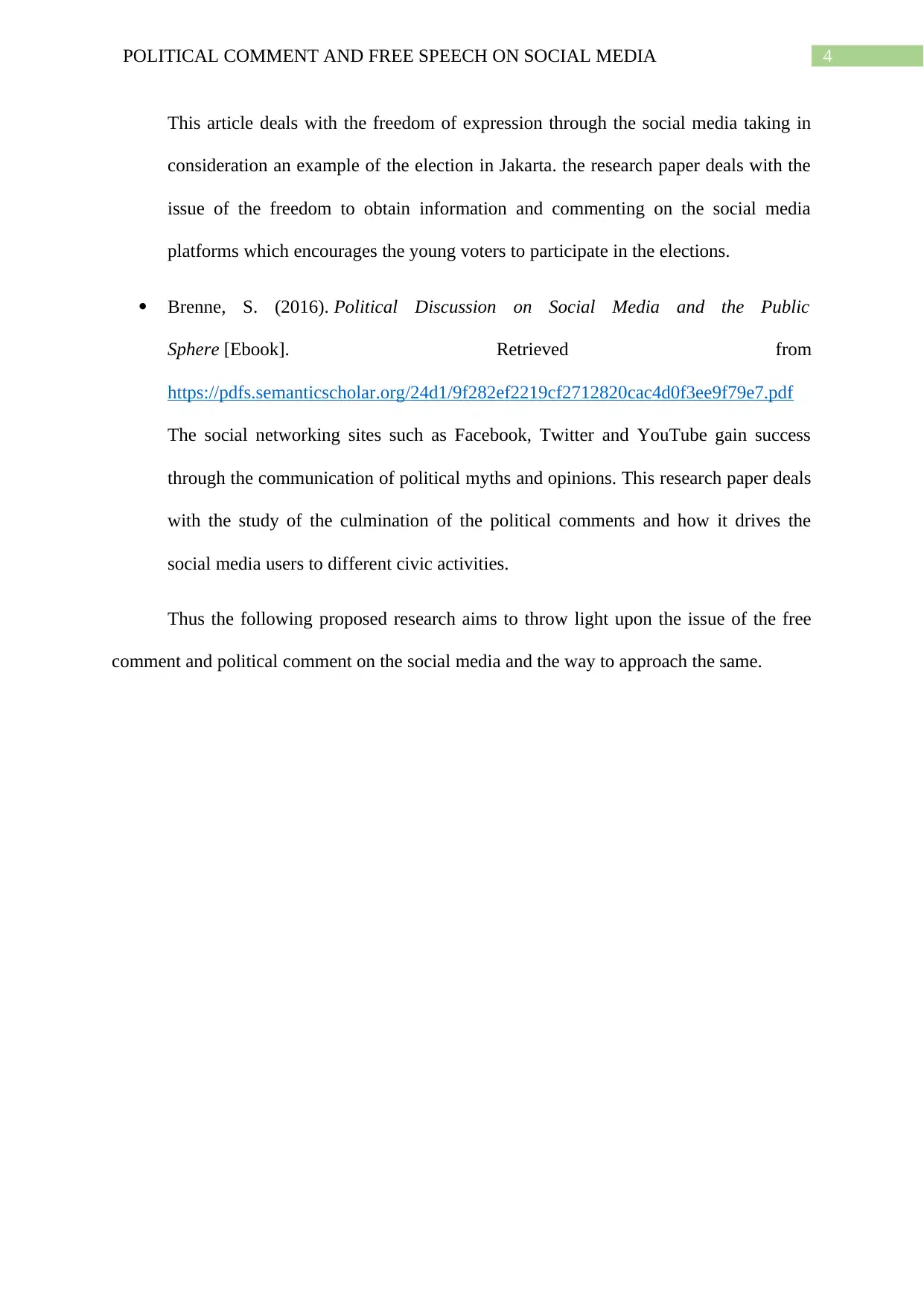
4POLITICAL COMMENT AND FREE SPEECH ON SOCIAL MEDIA
This article deals with the freedom of expression through the social media taking in
consideration an example of the election in Jakarta. the research paper deals with the
issue of the freedom to obtain information and commenting on the social media
platforms which encourages the young voters to participate in the elections.
Brenne, S. (2016). Political Discussion on Social Media and the Public
Sphere [Ebook]. Retrieved from
https://pdfs.semanticscholar.org/24d1/9f282ef2219cf2712820cac4d0f3ee9f79e7.pdf
The social networking sites such as Facebook, Twitter and YouTube gain success
through the communication of political myths and opinions. This research paper deals
with the study of the culmination of the political comments and how it drives the
social media users to different civic activities.
Thus the following proposed research aims to throw light upon the issue of the free
comment and political comment on the social media and the way to approach the same.
This article deals with the freedom of expression through the social media taking in
consideration an example of the election in Jakarta. the research paper deals with the
issue of the freedom to obtain information and commenting on the social media
platforms which encourages the young voters to participate in the elections.
Brenne, S. (2016). Political Discussion on Social Media and the Public
Sphere [Ebook]. Retrieved from
https://pdfs.semanticscholar.org/24d1/9f282ef2219cf2712820cac4d0f3ee9f79e7.pdf
The social networking sites such as Facebook, Twitter and YouTube gain success
through the communication of political myths and opinions. This research paper deals
with the study of the culmination of the political comments and how it drives the
social media users to different civic activities.
Thus the following proposed research aims to throw light upon the issue of the free
comment and political comment on the social media and the way to approach the same.
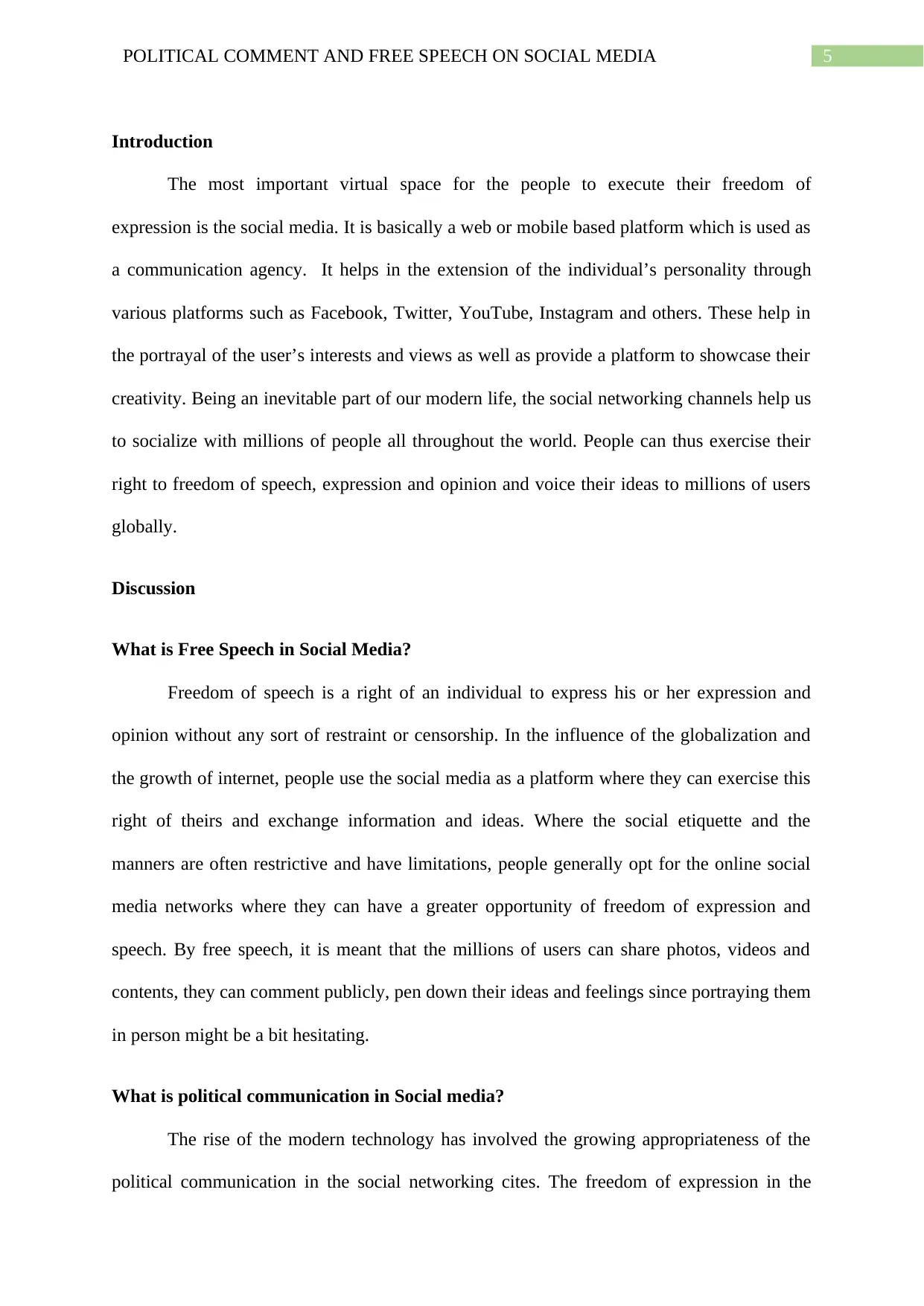
5POLITICAL COMMENT AND FREE SPEECH ON SOCIAL MEDIA
Introduction
The most important virtual space for the people to execute their freedom of
expression is the social media. It is basically a web or mobile based platform which is used as
a communication agency. It helps in the extension of the individual’s personality through
various platforms such as Facebook, Twitter, YouTube, Instagram and others. These help in
the portrayal of the user’s interests and views as well as provide a platform to showcase their
creativity. Being an inevitable part of our modern life, the social networking channels help us
to socialize with millions of people all throughout the world. People can thus exercise their
right to freedom of speech, expression and opinion and voice their ideas to millions of users
globally.
Discussion
What is Free Speech in Social Media?
Freedom of speech is a right of an individual to express his or her expression and
opinion without any sort of restraint or censorship. In the influence of the globalization and
the growth of internet, people use the social media as a platform where they can exercise this
right of theirs and exchange information and ideas. Where the social etiquette and the
manners are often restrictive and have limitations, people generally opt for the online social
media networks where they can have a greater opportunity of freedom of expression and
speech. By free speech, it is meant that the millions of users can share photos, videos and
contents, they can comment publicly, pen down their ideas and feelings since portraying them
in person might be a bit hesitating.
What is political communication in Social media?
The rise of the modern technology has involved the growing appropriateness of the
political communication in the social networking cites. The freedom of expression in the
Introduction
The most important virtual space for the people to execute their freedom of
expression is the social media. It is basically a web or mobile based platform which is used as
a communication agency. It helps in the extension of the individual’s personality through
various platforms such as Facebook, Twitter, YouTube, Instagram and others. These help in
the portrayal of the user’s interests and views as well as provide a platform to showcase their
creativity. Being an inevitable part of our modern life, the social networking channels help us
to socialize with millions of people all throughout the world. People can thus exercise their
right to freedom of speech, expression and opinion and voice their ideas to millions of users
globally.
Discussion
What is Free Speech in Social Media?
Freedom of speech is a right of an individual to express his or her expression and
opinion without any sort of restraint or censorship. In the influence of the globalization and
the growth of internet, people use the social media as a platform where they can exercise this
right of theirs and exchange information and ideas. Where the social etiquette and the
manners are often restrictive and have limitations, people generally opt for the online social
media networks where they can have a greater opportunity of freedom of expression and
speech. By free speech, it is meant that the millions of users can share photos, videos and
contents, they can comment publicly, pen down their ideas and feelings since portraying them
in person might be a bit hesitating.
What is political communication in Social media?
The rise of the modern technology has involved the growing appropriateness of the
political communication in the social networking cites. The freedom of expression in the
⊘ This is a preview!⊘
Do you want full access?
Subscribe today to unlock all pages.

Trusted by 1+ million students worldwide
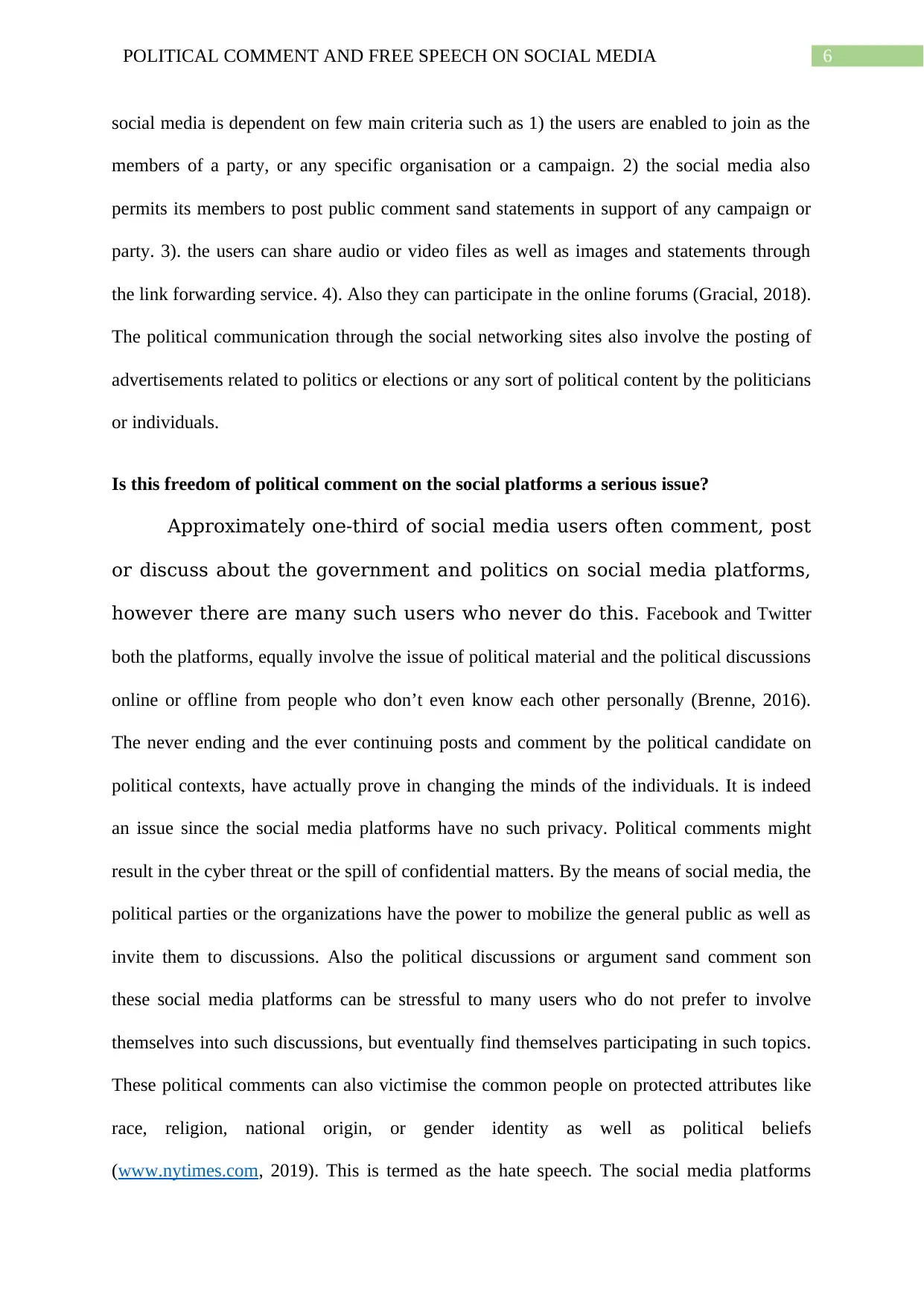
6POLITICAL COMMENT AND FREE SPEECH ON SOCIAL MEDIA
social media is dependent on few main criteria such as 1) the users are enabled to join as the
members of a party, or any specific organisation or a campaign. 2) the social media also
permits its members to post public comment sand statements in support of any campaign or
party. 3). the users can share audio or video files as well as images and statements through
the link forwarding service. 4). Also they can participate in the online forums (Gracial, 2018).
The political communication through the social networking sites also involve the posting of
advertisements related to politics or elections or any sort of political content by the politicians
or individuals.
Is this freedom of political comment on the social platforms a serious issue?
Approximately one-third of social media users often comment, post
or discuss about the government and politics on social media platforms,
however there are many such users who never do this. Facebook and Twitter
both the platforms, equally involve the issue of political material and the political discussions
online or offline from people who don’t even know each other personally (Brenne, 2016).
The never ending and the ever continuing posts and comment by the political candidate on
political contexts, have actually prove in changing the minds of the individuals. It is indeed
an issue since the social media platforms have no such privacy. Political comments might
result in the cyber threat or the spill of confidential matters. By the means of social media, the
political parties or the organizations have the power to mobilize the general public as well as
invite them to discussions. Also the political discussions or argument sand comment son
these social media platforms can be stressful to many users who do not prefer to involve
themselves into such discussions, but eventually find themselves participating in such topics.
These political comments can also victimise the common people on protected attributes like
race, religion, national origin, or gender identity as well as political beliefs
(www.nytimes.com, 2019). This is termed as the hate speech. The social media platforms
social media is dependent on few main criteria such as 1) the users are enabled to join as the
members of a party, or any specific organisation or a campaign. 2) the social media also
permits its members to post public comment sand statements in support of any campaign or
party. 3). the users can share audio or video files as well as images and statements through
the link forwarding service. 4). Also they can participate in the online forums (Gracial, 2018).
The political communication through the social networking sites also involve the posting of
advertisements related to politics or elections or any sort of political content by the politicians
or individuals.
Is this freedom of political comment on the social platforms a serious issue?
Approximately one-third of social media users often comment, post
or discuss about the government and politics on social media platforms,
however there are many such users who never do this. Facebook and Twitter
both the platforms, equally involve the issue of political material and the political discussions
online or offline from people who don’t even know each other personally (Brenne, 2016).
The never ending and the ever continuing posts and comment by the political candidate on
political contexts, have actually prove in changing the minds of the individuals. It is indeed
an issue since the social media platforms have no such privacy. Political comments might
result in the cyber threat or the spill of confidential matters. By the means of social media, the
political parties or the organizations have the power to mobilize the general public as well as
invite them to discussions. Also the political discussions or argument sand comment son
these social media platforms can be stressful to many users who do not prefer to involve
themselves into such discussions, but eventually find themselves participating in such topics.
These political comments can also victimise the common people on protected attributes like
race, religion, national origin, or gender identity as well as political beliefs
(www.nytimes.com, 2019). This is termed as the hate speech. The social media platforms
Paraphrase This Document
Need a fresh take? Get an instant paraphrase of this document with our AI Paraphraser
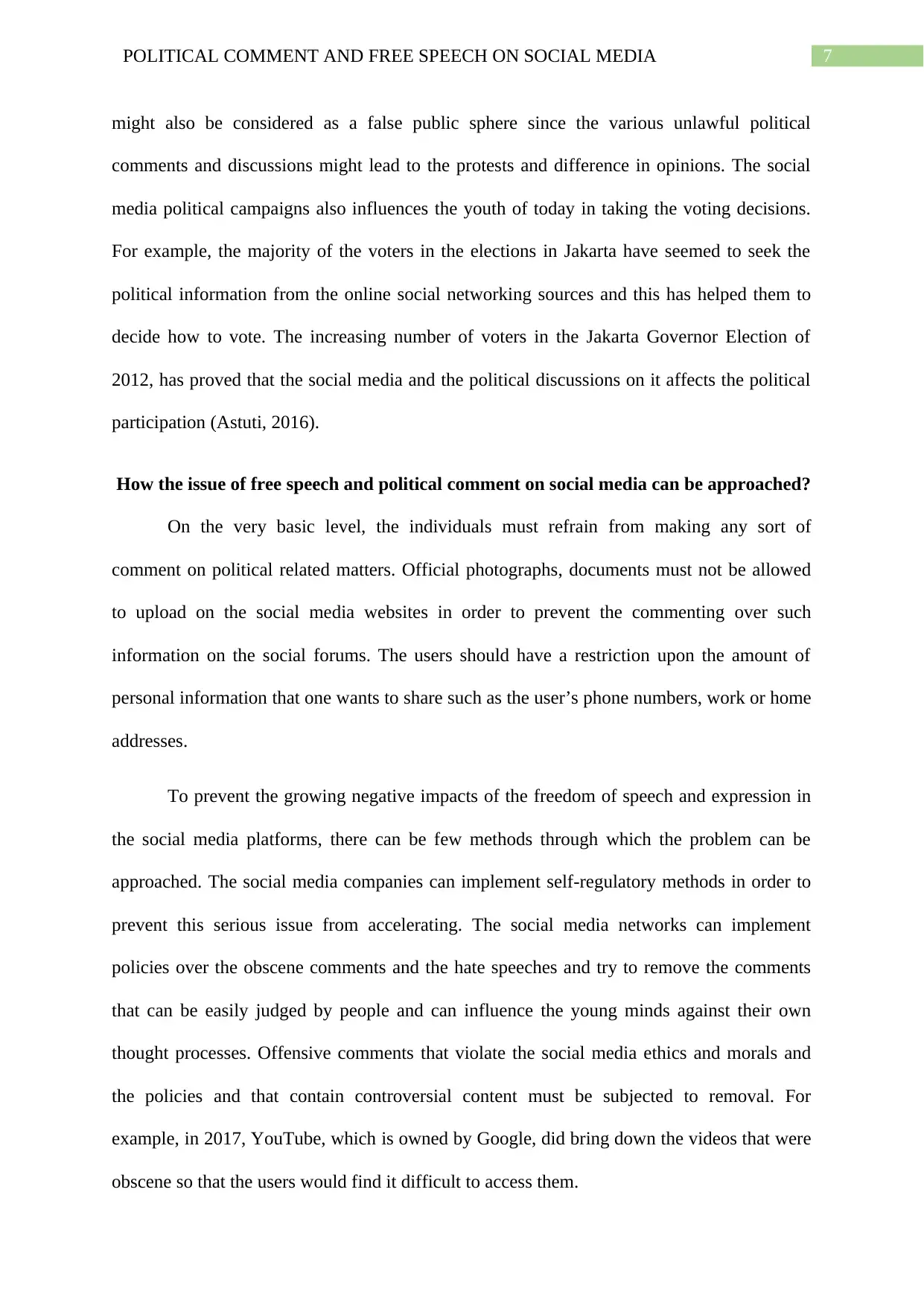
7POLITICAL COMMENT AND FREE SPEECH ON SOCIAL MEDIA
might also be considered as a false public sphere since the various unlawful political
comments and discussions might lead to the protests and difference in opinions. The social
media political campaigns also influences the youth of today in taking the voting decisions.
For example, the majority of the voters in the elections in Jakarta have seemed to seek the
political information from the online social networking sources and this has helped them to
decide how to vote. The increasing number of voters in the Jakarta Governor Election of
2012, has proved that the social media and the political discussions on it affects the political
participation (Astuti, 2016).
How the issue of free speech and political comment on social media can be approached?
On the very basic level, the individuals must refrain from making any sort of
comment on political related matters. Official photographs, documents must not be allowed
to upload on the social media websites in order to prevent the commenting over such
information on the social forums. The users should have a restriction upon the amount of
personal information that one wants to share such as the user’s phone numbers, work or home
addresses.
To prevent the growing negative impacts of the freedom of speech and expression in
the social media platforms, there can be few methods through which the problem can be
approached. The social media companies can implement self-regulatory methods in order to
prevent this serious issue from accelerating. The social media networks can implement
policies over the obscene comments and the hate speeches and try to remove the comments
that can be easily judged by people and can influence the young minds against their own
thought processes. Offensive comments that violate the social media ethics and morals and
the policies and that contain controversial content must be subjected to removal. For
example, in 2017, YouTube, which is owned by Google, did bring down the videos that were
obscene so that the users would find it difficult to access them.
might also be considered as a false public sphere since the various unlawful political
comments and discussions might lead to the protests and difference in opinions. The social
media political campaigns also influences the youth of today in taking the voting decisions.
For example, the majority of the voters in the elections in Jakarta have seemed to seek the
political information from the online social networking sources and this has helped them to
decide how to vote. The increasing number of voters in the Jakarta Governor Election of
2012, has proved that the social media and the political discussions on it affects the political
participation (Astuti, 2016).
How the issue of free speech and political comment on social media can be approached?
On the very basic level, the individuals must refrain from making any sort of
comment on political related matters. Official photographs, documents must not be allowed
to upload on the social media websites in order to prevent the commenting over such
information on the social forums. The users should have a restriction upon the amount of
personal information that one wants to share such as the user’s phone numbers, work or home
addresses.
To prevent the growing negative impacts of the freedom of speech and expression in
the social media platforms, there can be few methods through which the problem can be
approached. The social media companies can implement self-regulatory methods in order to
prevent this serious issue from accelerating. The social media networks can implement
policies over the obscene comments and the hate speeches and try to remove the comments
that can be easily judged by people and can influence the young minds against their own
thought processes. Offensive comments that violate the social media ethics and morals and
the policies and that contain controversial content must be subjected to removal. For
example, in 2017, YouTube, which is owned by Google, did bring down the videos that were
obscene so that the users would find it difficult to access them.
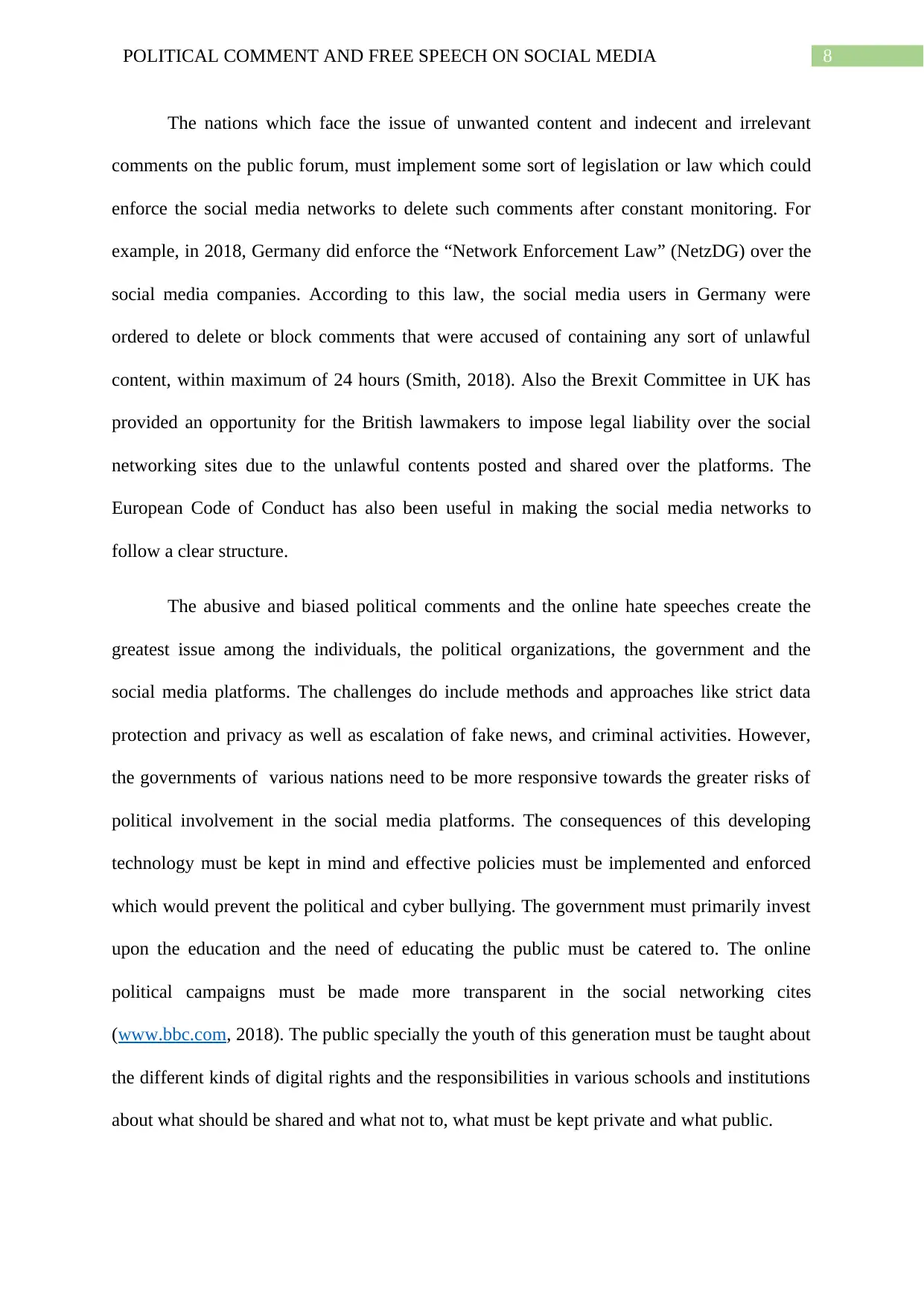
8POLITICAL COMMENT AND FREE SPEECH ON SOCIAL MEDIA
The nations which face the issue of unwanted content and indecent and irrelevant
comments on the public forum, must implement some sort of legislation or law which could
enforce the social media networks to delete such comments after constant monitoring. For
example, in 2018, Germany did enforce the “Network Enforcement Law” (NetzDG) over the
social media companies. According to this law, the social media users in Germany were
ordered to delete or block comments that were accused of containing any sort of unlawful
content, within maximum of 24 hours (Smith, 2018). Also the Brexit Committee in UK has
provided an opportunity for the British lawmakers to impose legal liability over the social
networking sites due to the unlawful contents posted and shared over the platforms. The
European Code of Conduct has also been useful in making the social media networks to
follow a clear structure.
The abusive and biased political comments and the online hate speeches create the
greatest issue among the individuals, the political organizations, the government and the
social media platforms. The challenges do include methods and approaches like strict data
protection and privacy as well as escalation of fake news, and criminal activities. However,
the governments of various nations need to be more responsive towards the greater risks of
political involvement in the social media platforms. The consequences of this developing
technology must be kept in mind and effective policies must be implemented and enforced
which would prevent the political and cyber bullying. The government must primarily invest
upon the education and the need of educating the public must be catered to. The online
political campaigns must be made more transparent in the social networking cites
(www.bbc.com, 2018). The public specially the youth of this generation must be taught about
the different kinds of digital rights and the responsibilities in various schools and institutions
about what should be shared and what not to, what must be kept private and what public.
The nations which face the issue of unwanted content and indecent and irrelevant
comments on the public forum, must implement some sort of legislation or law which could
enforce the social media networks to delete such comments after constant monitoring. For
example, in 2018, Germany did enforce the “Network Enforcement Law” (NetzDG) over the
social media companies. According to this law, the social media users in Germany were
ordered to delete or block comments that were accused of containing any sort of unlawful
content, within maximum of 24 hours (Smith, 2018). Also the Brexit Committee in UK has
provided an opportunity for the British lawmakers to impose legal liability over the social
networking sites due to the unlawful contents posted and shared over the platforms. The
European Code of Conduct has also been useful in making the social media networks to
follow a clear structure.
The abusive and biased political comments and the online hate speeches create the
greatest issue among the individuals, the political organizations, the government and the
social media platforms. The challenges do include methods and approaches like strict data
protection and privacy as well as escalation of fake news, and criminal activities. However,
the governments of various nations need to be more responsive towards the greater risks of
political involvement in the social media platforms. The consequences of this developing
technology must be kept in mind and effective policies must be implemented and enforced
which would prevent the political and cyber bullying. The government must primarily invest
upon the education and the need of educating the public must be catered to. The online
political campaigns must be made more transparent in the social networking cites
(www.bbc.com, 2018). The public specially the youth of this generation must be taught about
the different kinds of digital rights and the responsibilities in various schools and institutions
about what should be shared and what not to, what must be kept private and what public.
⊘ This is a preview!⊘
Do you want full access?
Subscribe today to unlock all pages.

Trusted by 1+ million students worldwide
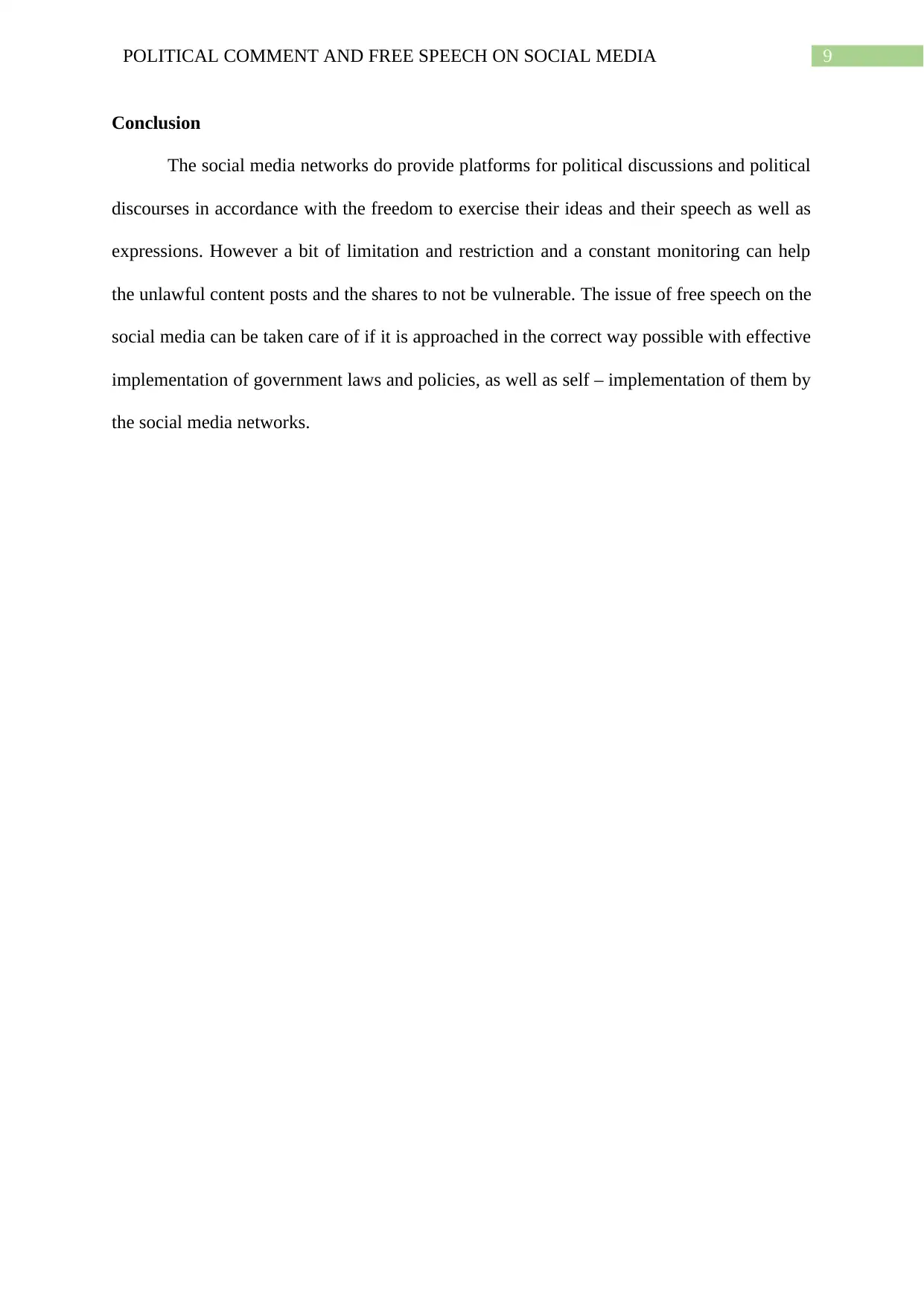
9POLITICAL COMMENT AND FREE SPEECH ON SOCIAL MEDIA
Conclusion
The social media networks do provide platforms for political discussions and political
discourses in accordance with the freedom to exercise their ideas and their speech as well as
expressions. However a bit of limitation and restriction and a constant monitoring can help
the unlawful content posts and the shares to not be vulnerable. The issue of free speech on the
social media can be taken care of if it is approached in the correct way possible with effective
implementation of government laws and policies, as well as self – implementation of them by
the social media networks.
Conclusion
The social media networks do provide platforms for political discussions and political
discourses in accordance with the freedom to exercise their ideas and their speech as well as
expressions. However a bit of limitation and restriction and a constant monitoring can help
the unlawful content posts and the shares to not be vulnerable. The issue of free speech on the
social media can be taken care of if it is approached in the correct way possible with effective
implementation of government laws and policies, as well as self – implementation of them by
the social media networks.
Paraphrase This Document
Need a fresh take? Get an instant paraphrase of this document with our AI Paraphraser
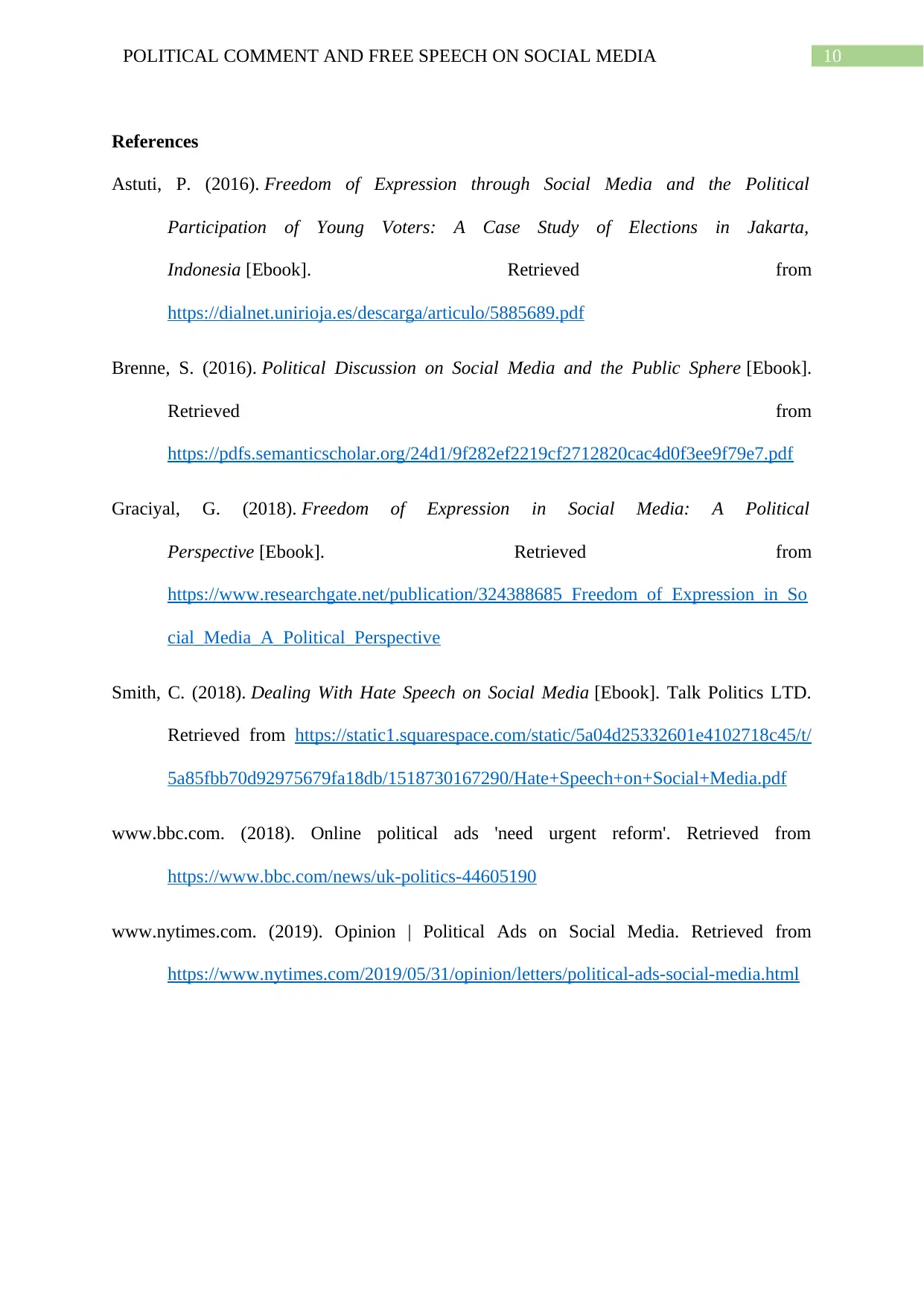
10POLITICAL COMMENT AND FREE SPEECH ON SOCIAL MEDIA
References
Astuti, P. (2016). Freedom of Expression through Social Media and the Political
Participation of Young Voters: A Case Study of Elections in Jakarta,
Indonesia [Ebook]. Retrieved from
https://dialnet.unirioja.es/descarga/articulo/5885689.pdf
Brenne, S. (2016). Political Discussion on Social Media and the Public Sphere [Ebook].
Retrieved from
https://pdfs.semanticscholar.org/24d1/9f282ef2219cf2712820cac4d0f3ee9f79e7.pdf
Graciyal, G. (2018). Freedom of Expression in Social Media: A Political
Perspective [Ebook]. Retrieved from
https://www.researchgate.net/publication/324388685_Freedom_of_Expression_in_So
cial_Media_A_Political_Perspective
Smith, C. (2018). Dealing With Hate Speech on Social Media [Ebook]. Talk Politics LTD.
Retrieved from https://static1.squarespace.com/static/5a04d25332601e4102718c45/t/
5a85fbb70d92975679fa18db/1518730167290/Hate+Speech+on+Social+Media.pdf
www.bbc.com. (2018). Online political ads 'need urgent reform'. Retrieved from
https://www.bbc.com/news/uk-politics-44605190
www.nytimes.com. (2019). Opinion | Political Ads on Social Media. Retrieved from
https://www.nytimes.com/2019/05/31/opinion/letters/political-ads-social-media.html
References
Astuti, P. (2016). Freedom of Expression through Social Media and the Political
Participation of Young Voters: A Case Study of Elections in Jakarta,
Indonesia [Ebook]. Retrieved from
https://dialnet.unirioja.es/descarga/articulo/5885689.pdf
Brenne, S. (2016). Political Discussion on Social Media and the Public Sphere [Ebook].
Retrieved from
https://pdfs.semanticscholar.org/24d1/9f282ef2219cf2712820cac4d0f3ee9f79e7.pdf
Graciyal, G. (2018). Freedom of Expression in Social Media: A Political
Perspective [Ebook]. Retrieved from
https://www.researchgate.net/publication/324388685_Freedom_of_Expression_in_So
cial_Media_A_Political_Perspective
Smith, C. (2018). Dealing With Hate Speech on Social Media [Ebook]. Talk Politics LTD.
Retrieved from https://static1.squarespace.com/static/5a04d25332601e4102718c45/t/
5a85fbb70d92975679fa18db/1518730167290/Hate+Speech+on+Social+Media.pdf
www.bbc.com. (2018). Online political ads 'need urgent reform'. Retrieved from
https://www.bbc.com/news/uk-politics-44605190
www.nytimes.com. (2019). Opinion | Political Ads on Social Media. Retrieved from
https://www.nytimes.com/2019/05/31/opinion/letters/political-ads-social-media.html
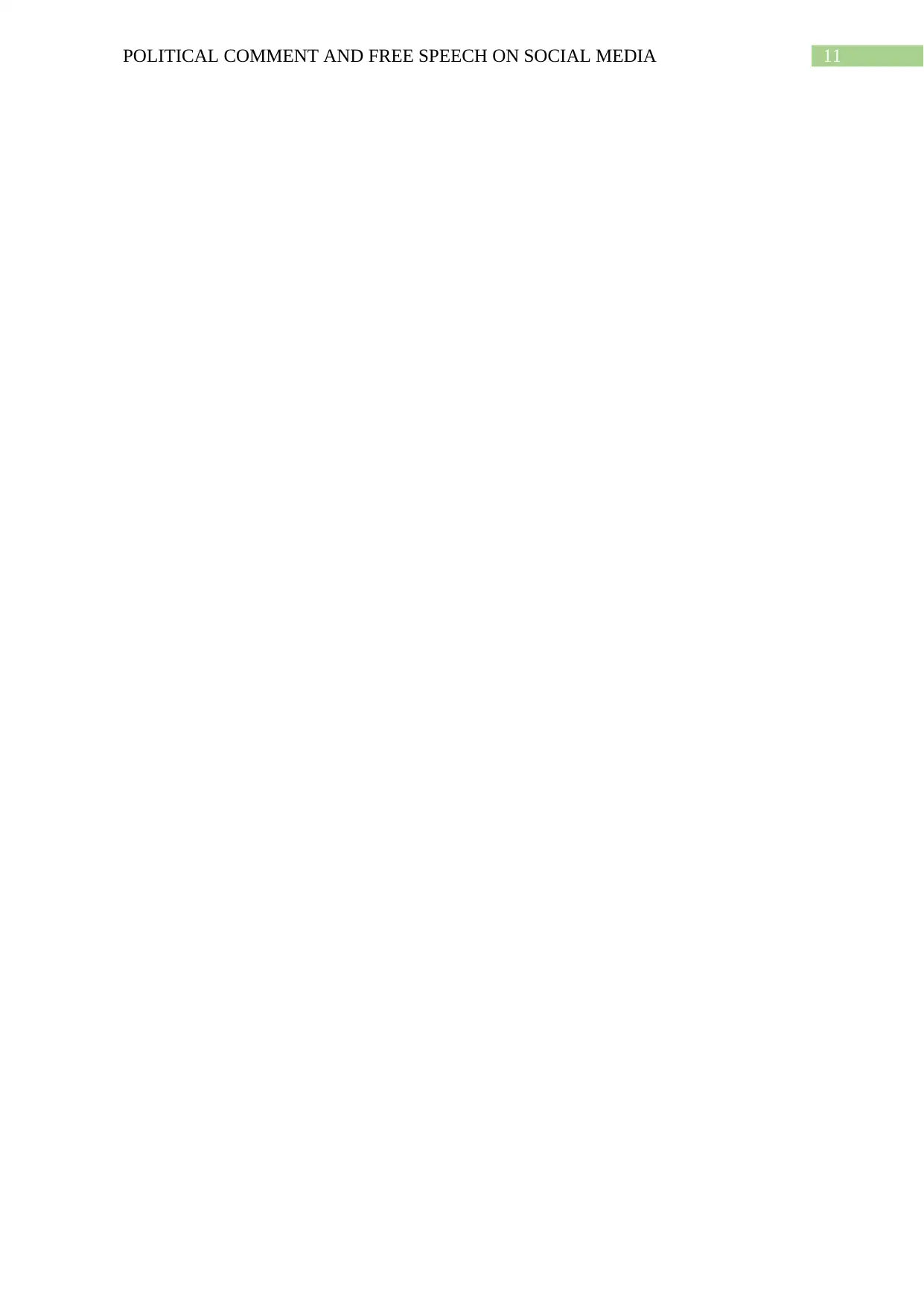
11POLITICAL COMMENT AND FREE SPEECH ON SOCIAL MEDIA
⊘ This is a preview!⊘
Do you want full access?
Subscribe today to unlock all pages.

Trusted by 1+ million students worldwide
1 out of 12
Related Documents
Your All-in-One AI-Powered Toolkit for Academic Success.
+13062052269
info@desklib.com
Available 24*7 on WhatsApp / Email
![[object Object]](/_next/static/media/star-bottom.7253800d.svg)
Unlock your academic potential
Copyright © 2020–2026 A2Z Services. All Rights Reserved. Developed and managed by ZUCOL.





